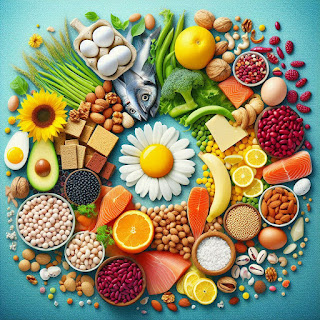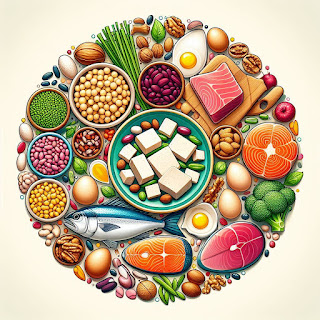The Power of Protein: Essential Role in a Healthy Diet
The Power of Protein: Essential Role in a Healthy Diet
Protein is more than just a buzzword in the world of nutrition—it's a cornerstone of our diet, vital for maintaining and improving overall health. As one of the three macronutrients, along with carbohydrates and fats, protein plays an indispensable role in building and repairing tissues, producing enzymes and hormones, and supporting immune function. Let's dive into the importance of protein, its sources, and how to ensure you're getting enough in your diet.
Why Protein Matters
Building and Repairing Tissues: Protein is essential for the growth and repair of tissues in our body. This is particularly important for athletes, growing children, and those recovering from injuries or surgeries. Muscles, skin, hair, and nails all rely on protein to stay healthy and strong.
Enzyme and Hormone Production: Enzymes, which facilitate biochemical reactions in the body, are made up of proteins. Hormones, which act as chemical messengers, also depend on protein for their synthesis. These functions are crucial for metabolism, digestion, and overall bodily functions.
Immune System Support: Proteins are vital for a robust immune system. Antibodies, which fight off infections, are made of protein. A protein-rich diet helps ensure that the body can effectively combat pathogens and stay healthy.
Energy Source: While not the primary energy source, protein can be utilized by the body for energy when carbohydrate and fat stores are low. This is particularly relevant during periods of intense physical activity or caloric restriction.
Sources of Protein
Protein can be sourced from both animal and plant-based foods, each offering unique benefits:
Animal-Based Sources: Meat, poultry, fish, eggs, and dairy products are rich in high-quality protein, containing all essential amino acids. These sources are particularly beneficial for their bioavailability and completeness.
Plant-Based Sources: Beans, lentils, tofu, tempeh, quinoa, nuts, and seeds are excellent plant-based protein sources. While some plant proteins may lack one or more essential amino acids, combining different plant proteins can provide a complete amino acid profile.
How Much Protein Do You Need?
The recommended dietary allowance (RDA) for protein varies based on age, sex, and activity level. On average, adults should aim for 0.8 grams of protein per kilogram of body weight. However, athletes, pregnant women, and the elderly may require higher amounts.
Tips for Increasing Protein Intake
Include Protein in Every Meal: Aim to have a source of protein with each meal and snack. This helps maintain muscle mass and keeps you feeling full longer.
Diversify Your Sources: Incorporate a mix of animal and plant-based proteins to ensure a balanced intake of nutrients.
Protein-Rich Snacks: Opt for high-protein snacks like Greek yogurt, cheese, nuts, or a protein smoothie to keep your energy levels stable throughout the day.
Smart Substitutions: Replace refined carbs with protein-rich alternatives. For example, use quinoa instead of rice or lentil pasta instead of wheat pasta.
Incorporating adequate protein into your diet is fundamental to supporting your body's various functions and maintaining overall health. By understanding the role of protein, selecting diverse sources, and ensuring you meet your daily requirements, you can harness the power of this essential nutrient to lead a healthier, more energetic life.
For more tips on nutrition and diet, be sure to follow 'Sara Nutrition' and stay updated with the latest insights on healthy living!







Comments
Post a Comment